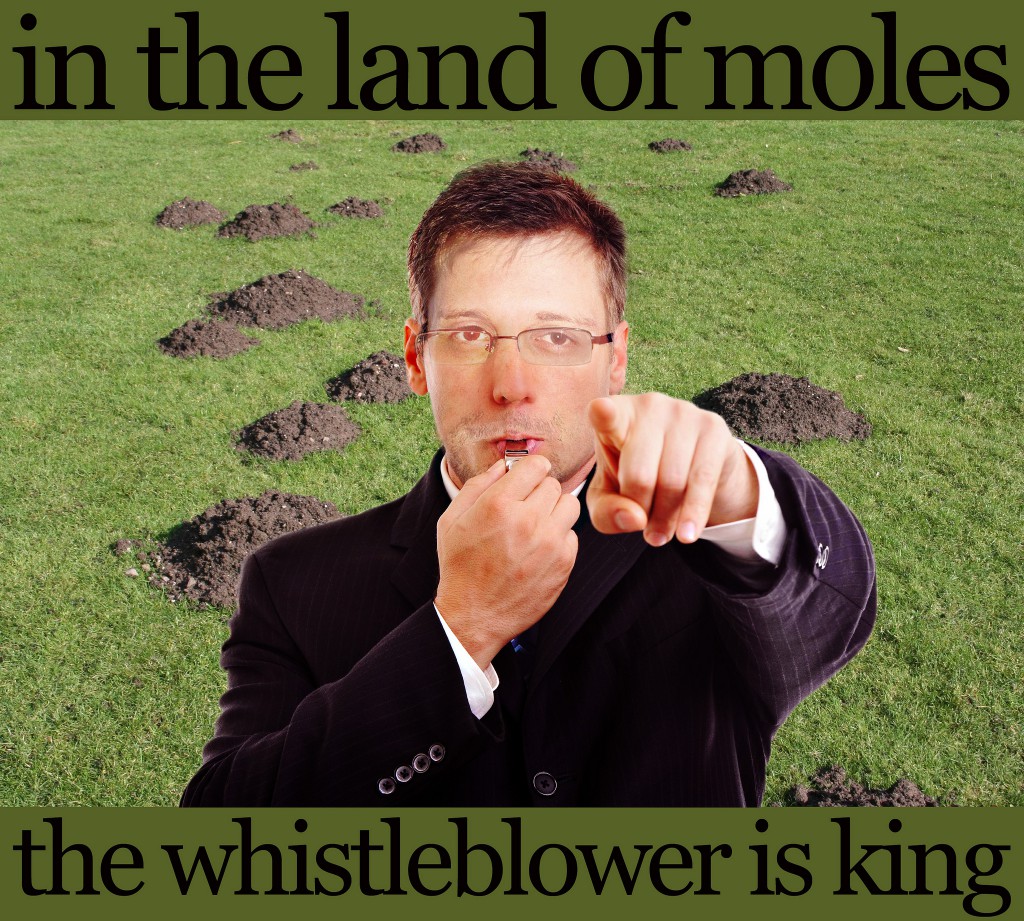How should whistle-blowers be treated in the laws and in the media
Published in Journalistic Lessons
on 17 - 05 - 2015 Author: Administrator
„”In the land of moles, the whistle-blower is king”. Today’s most famous whistle-blower – Edward Snowden. Photo: Tjebbe van Tijen, 2013
The involvement of the media is inevitable in the whistle-blowing process, as well as the involvement of the civil society organizations as an important segment that connects citizens with the public institutions and enables easier circulation of information.
Author: Vlado Gjorchev
An unfavorable climate is present in Macedonia, where the media, NGOs, public and private companies, and citizens themselves have difficulties in achieving a more active, quality inclusion but also in presenting the problems they are facing on a daily basis. We could overcome this situation if policy-makers enable an improved accessibility and openness for the citizens, and provide solutions for improved functioning of the society. Experts say that when it comes to whistle-blowers, these are the main reasons.
According to Slagjana Taseva, president of “Transparency Macedonia”, we should provide greater protection for whistle-blowers in terms of the risks and consequences they are facing. To that end, it is necessary to provide accessible channels for whistle-blowing, and functional mechanisms for disclosure that promote reforms for correction of the legislative, political or procedural deficiencies and for preventing future abuses. If the Law on Prevention of Corruption is amended by introducing articles related to whistle-blowers, these articles should cover several aspects, such as: the whistle-blowing method, institutions that citizens could turn to, the status of the citizens as well as their protection and the protection of their families from all acts of reprisal.
Macedonia must find an effective way to also protect whistle-blowers, not just people who report corruption, because whistle-blowing should include revealing illegal, unethical, immoral and other types of behaviors – said Taseva at the conference dedicated to this topic.
MEDIA AND WHISTLE-BLOWERS
The involvement of the media is inevitable in the whistle-blowing process, as well as the involvement of the civil society organizations as an important segment that connects citizens with the public institutions and enables easier circulation of information.
However, all segments of society, when joined together constitute a whole, and if institutions cooperate and work together for the common good, they could enable a better, more efficient and functional system that the citizens could trust and use it to disclose all irregularities and illegalities that hinder the normal course of functioning of institutions and society in general.
Here the media have to play a major role because according to professor Gjorgji Spasov, we must work on raising the awareness of citizens about how important it is to report any illegal or immoral activity.
No legal solution, even if it is regulated in the best way possible, can “wake up” the whistleblowers. We need to define a descriptive term that can explain the whistle-blower concept and its meaning in Macedonia – said Spasov.
SURVEY
According to the survey on protection of whistle-blowers, conducted by the “Rating” agency, more than 70 percent of respondents would report a case of unethical and illegal action, and 26.6 percent would not. 7.5 percent of respondents stated that they would report illegal activities by the company in which they work, and 22 percent would not report such activities.
The survey resulted with a startling fact that over 13 percent of the respondents had witnessed or were able to report corruption, but 10.5 percent didn’t report it, mostly due to fear. Only 11 of 400 respondents reported corruption. Four of these 11 respondents indicated that the case had been closed, four respondents said the case is under way and three of them said that the case was not closed.
Half of the respondents, or 54 percent believe that whistle-blowers are completely unprotected, and 49 believe they are protected. Howver, as much as 70 percent said they would face consequences if they report illegal activities, and most of them think that they will lose their jobs or be under some kind of pressure.
JOURNALIST STORIES
Citizens’ trust in the institutions is constantly dropping, i.e. they are seldom seeking the solution to their problems by addressing the institutions, because they are sure they will not receive any help. This is why they turn to the media, although they know their problem is not going to be solved, but at least the public will hear about the hardship or injustice they have experienced, says Valentina Stojanchevska from the “Fokus” weekly, a journalist working on this topic.
It all depends on the story, but whistle-blowers often ask us to hide their identity, i.e. to remain anonymous. This is due to the fear of consequences. For example, when I was doing the survey about the non-payment of K-15, I had many interlocutors, but all of them demanded to remain anonymous because they feared losing their jobs. All of them said that the employers demanded them to return the paid fee for K-15, but wanted to remain anonymous because they would not like to lose their jobs because of a complaint about 8,500 denars. Nevertheless, their anonymous testimony was sufficient in this case, because some of them called me after we published the articles, informing me that their employers were scared and told them they do not have to give the money back – said Stojancheva.
Citizens’ distrust in the competent institutions is indicated by the fact that the number of citizens’ complaints submitted to the State Commission for Prevention of Corruption is getting smaller every year. Specifically, the data indicates that the Commission received from 450 to 1,000 citizen complaints by 2010, and now the Commission barely receives 200 complaints.
The whistle-blowers are not protected, i.e. there are a lot of examples where some of the citizens, especially employees in state institutions, dared to report crime or corruption, but lost their jobs, were fined or reassigned to other jobs. And on top of everything else, they did not get justice in court. Well, since the Government through media campaigns, asked its citizens to “dare”, it should now dare to give them the protection they need, if it sincerely wants to fight corruption and crime – she says.
Despite the lack of protection, as long as the “state nurseries” are employing people according to party or loyalty merits, we cannot expect increased awareness and an increased number of whistleblowers. These people will always feel as obliged subordinates, so instead of raising their voices, they would rather remain silent.
JOURNALIST ARTICLES
No matter how strong the “whistleblowers” are, the silence of the competent politicized institutions is so much louder, i.e. the judiciary by default takes the side of the accused, and not the whistleblowers.
According to the experience of the journalist of “Fokus” Ljubisha Arsic, who participated in the project of “Transparency Macedonia” for dealing with whistleblowers, if an employee reveals that his superior or the director has committed a crime, the employee loses his/her job and the accused is never held accountable for his/her criminal actions.
The perpetrator is assisted due to his political relations or the money he provides to the government. I have written many stories about the fear and risk whistleblowers are facing, and I can draw a conclusion that they initially find it very difficult to decide to “blow the whistle”, and if they do – they risk being penalized with a percent of their salary, which is the best option, to be reassigned to another job as a worse option or to lose their job, as the worst option, although that should happen to the perpetrator, not the whistleblower – said Arsic.
Practically, company directors or heads of state institutions are using their positions and relations with the government to influence the public prosecution when it comes to criminal charges against them.
On the other hand, they are using their power to take revenge on the whistleblowers. For example, I’ve written articles about a number of companies that take revenge on the trade unionists, or union leaders, to be more precise. The examples with the “Sasa” mine and “Rade Koncar” clearly indicate what happens to the whistleblowers in Macedonia. After revealing that their superiors are breaking the law, trade union leaders lost their jobs, counter-charges were filed against them, and all of that was detrimental to the trade unions. After the union leaders failed, although they had concrete evidence of the crime, the directors dealt with the remaining trade unionists who easily gave up on any further trade union activities, and forgot about the crimes of the directors. Of course, they were afraid of losing their jobs – Arsic informs.
These examples clearly indicate that whistleblowers are not protected at all. Instead of encouraging others, these examples do the opposite – whistleblowers are being punished, and others are afraid.
This is why whistleblowers mostly report the crime to the media or to the NGOs rather than the institutions, hoping that they will help and provide an opportunity for something to be revealed, at the same time protecting the whistleblowers. Whistleblowers often insist to remain anonymous, except the ones who have already lost their jobs, and have nothing to lose.
Lately, foreign ambassadors in Macedonia have been calling for legal protection for the whistleblowers. The main reason for this were the wiretapped conversations revealed by SDSM’s leader, Zoran Zaev.
This journalistic lesson was created within the framework of the USAID Media Strengthening in Macedonia Project - Media Fact-Checking Service Component,, mplemented by Metamorphosis. The journalistic lesson is made possible by the generous support of the American people through the United States Agency for International Development (USAID). The contents are the responsibility of its author and do not necessarily reflect the views of Metamorphosis, USAID or the United States Government. For more information on the work of USAID in Macedonia please visit its website (http://macedonia.usaid.gov) and Facebook page (www.facebook.com/USAIDMacedonia).

